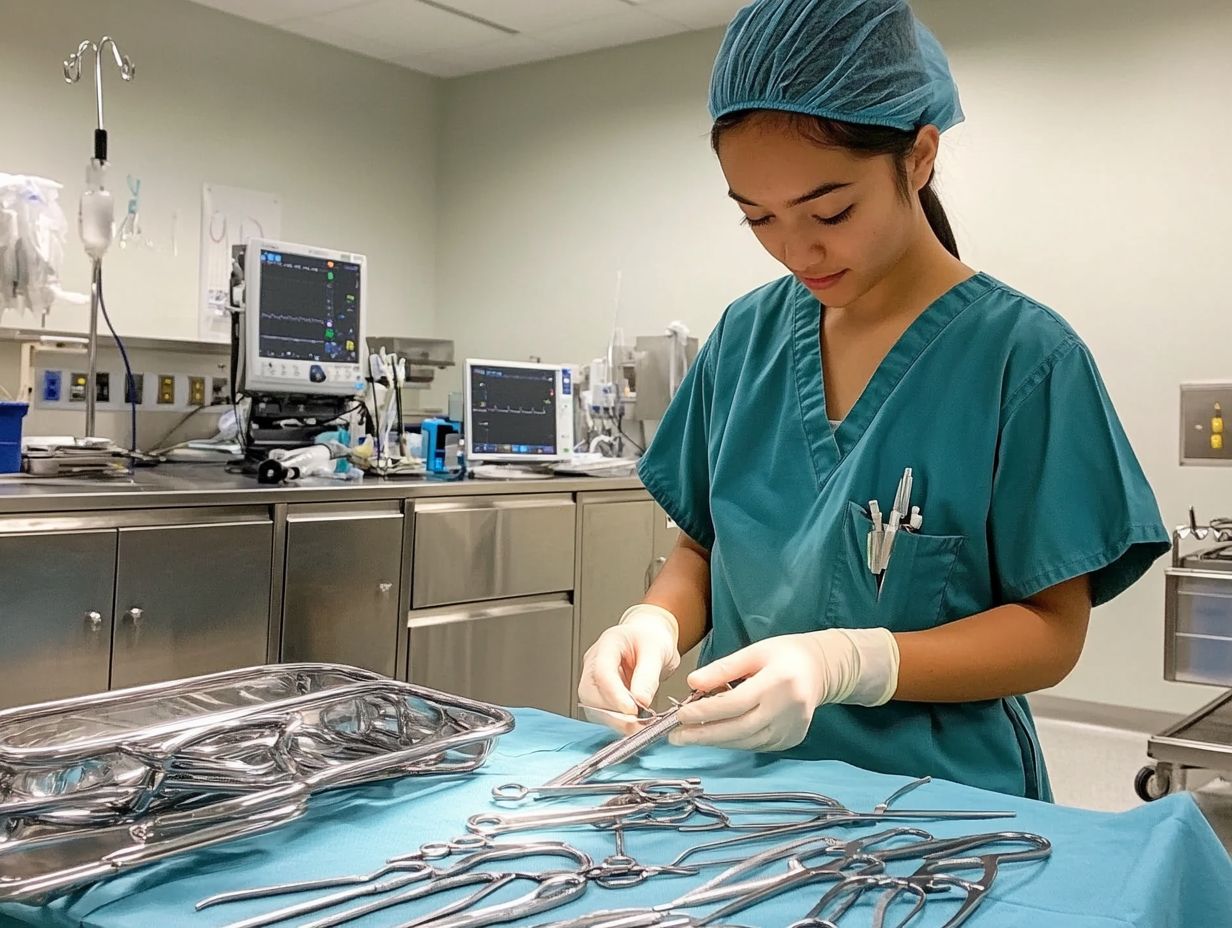Understanding the Role of a Certified Surgical Technician
The role of a Certified Surgical Technician is pivotal in the healthcare landscape, acting as a vital link between surgical teams and patient care.
In this article, you ll uncover the definition and responsibilities of surgical technicians, along with the education and training necessary to embark on this fulfilling career path.
Explore the essential skills and qualities that will set you up for success, gain insights into the working environment, and learn about the promising job outlook for this rewarding profession.
You ll also delve into the significance of certification, the value of continuing education, and the importance of collaboration with other healthcare professionals, illustrating how surgical technicians play a crucial role in achieving effective surgical outcomes.
Contents
- Key Takeaways:
- Overview of a Certified Surgical Technician
- Education and Training Requirements
- Skills and Qualities of a Successful Surgical Technician
- Working Environment and Job Outlook
- Importance of Certification and Continuing Education
- Collaboration with Other Healthcare Professionals
- Frequently Asked Questions
- What is the role of a certified surgical technician?
- What are the educational requirements to become a certified surgical technician?
- What skills are necessary for a certified surgical technician?
- What is the difference between a certified surgical technician and a surgical technologist?
- What types of surgeries do surgical techs assist in?
- What is the career outlook for surgical techs?
Key Takeaways:

A certified surgical technician plays a crucial role in the surgery team, supporting surgeons and ensuring the safe and efficient completion of surgical procedures.
To become a certified surgical technician, one must complete a formal education program, pass a certification exam, and continually engage in ongoing education to maintain their credentials.
A successful surgical technician possesses a combination of technical skills, such as operating surgical equipment, and personal attributes, such as attention to detail and the ability to work well under pressure.
Overview of a Certified Surgical Technician
As a Certified Surgical Technician, or surgical tech, you occupy a pivotal position in the operating room, keeping the area clean and safe while providing essential assistance to healthcare professionals during surgical procedures.
Your role includes many important tasks, from preparing for surgeries to managing surgical instruments and safeguarding patient safety throughout the entire process.
Your expertise is critical to the seamless functioning of the healthcare team, as you offer crucial support to surgeons, nurses, and anesthesiologists, significantly enhancing the effectiveness of surgical patient management.
Definition and Responsibilities
A surgical technologist, often called a surgical tech, is a critical player on the surgical team, tasked with the vital responsibility of preparing and maintaining the operating room for surgical procedures.
This role involves a range of crucial activities, including the meticulous organization and sanitization of instruments before surgery, ensuring that everything is not just clean but also primed and ready for the surgeon’s use.
Surgical techs enhance the efficiency of operations by passing instruments and materials to the surgeons promptly, making their presence invaluable during procedures.
They also ensure patient safety by maintaining constant vigilance, monitoring equipment, and making sure all sterile protocols are strictly followed.
Working together is essential in this role, as surgical techs collaborate closely with operating room technicians and other healthcare professionals. Good communication helps everyone work better together, fostering a cohesive environment that prioritizes both patient care and the overall success of surgical operations.
Education and Training Requirements
To become a Certified Surgical Technician, you typically embark on an accredited surgical tech program offered by community colleges, vocational schools, or via military training.
After successfully completing the program, the next step involves obtaining certification through recognized bodies, such as the National Board of Surgical Technology.
Steps to Becoming a Certified Surgical Technician
Becoming a Certified Surgical Technician involves several essential steps. Start by completing an accredited surgical tech education program, followed by the successful passage of the surgical tech certification exam. These steps are vital for establishing a solid foundation in both knowledge and hands-on skills.
Start your journey by enrolling in a recognized educational program that combines coursework with practical clinical training. Throughout your studies, dive into subjects like human anatomy, surgical procedures, and sterile techniques.
The clinical training component is particularly valuable. It allows you to work directly in surgical settings, gaining insights and experience that are truly invaluable. As you progress, hone your skills in effective communication, careful attention to detail, and the ability to operate efficiently under pressure.
These educational pursuits prepare you for the certification exam and equip you with the competencies necessary to excel in dynamic surgical environments.
Skills and Qualities of a Successful Surgical Technician

Successful surgical technicians possess a distinctive combination of technical skills and personal qualities that enable them to excel in the fast-paced, high-stakes environment of the operating room. Their surgical expertise plays a crucial role in influencing patient outcomes.
Technical Skills and Personal Attributes
Technical skills, such as handling surgical instruments and understanding procedures, are critical for surgical technicians. Essential personal attributes like strong communication and teamwork are equally important.
Manage tools and supplies skillfully, anticipating the needs of surgeons during operations. Master sterile techniques for patient safety, while understanding anatomy and procedural workflows enhances your effectiveness.
Personal qualities like adaptability and problem-solving are crucial in unpredictable and fast-paced surgical environments. Your ability to remain calm under pressure fosters a supportive atmosphere and enhances collaboration among team members.
The synergy between your technical competencies and personal traits plays a critical role in the success of surgical interventions and the quality of patient care.
Working Environment and Job Outlook
The working environment for surgical technicians is primarily in operating rooms within hospitals. Here, you collaborate closely with a dedicated team of healthcare professionals, including surgeons, nurses, and anesthesiologists, all focused on ensuring patient care and safety throughout surgical procedures.
Typical Work Settings and Career Opportunities
Surgical technicians work in various healthcare settings, including bustling hospitals, outpatient surgical centers, and specialty clinics. They contribute their expertise across a spectrum of surgical specialties, from pediatric surgery to cardiology.
In these dynamic environments, surgical technicians play a pivotal role in preparing operating rooms, ensuring instruments are sterilized, and assisting surgeons during operations.
The diversity of surgical specialties allows you to immerse yourself in a wide array of procedures, from minimally invasive techniques to intricate surgeries, significantly enhancing your skill set.
As you gain experience, numerous promising career advancement opportunities await, including pathways to surgical nursing or management roles that demand strong leadership skills.
In all these settings, teamwork is essential. Collaboration among surgeons, nurses, and surgical techs is crucial for ensuring patient safety and smooth surgical processes.
Importance of Certification and Continuing Education
Certification is a crucial element for surgical technicians. It not only validates their skills and expertise but also enhances patient safety and care within the operating room environment.
Benefits and Requirements for Maintaining Certification

Maintaining your surgical tech certification requires you to fulfill continuing education requirements. These offer an array of benefits, including enhanced skills, updated knowledge on surgical procedures, and increased job opportunities.
Ongoing training solidifies your expertise. It also helps you adapt to the fast-changing healthcare landscape.
Accessing various continuing education opportunities such as workshops, online courses, and hands-on training sessions will strengthen the foundational skills essential for success in surgical environments.
These initiatives keep you informed about the latest technologies and best practices, directly influencing patient outcomes.
Staying certified boosts your confidence and impresses employers of your unwavering commitment to excellence in surgical care.
Collaboration with Other Healthcare Professionals
Collaboration with other healthcare professionals is paramount for surgical technicians. Your role within the surgical team is not just important; it s critical for delivering comprehensive patient care and ensuring the success of surgical operations.
By working closely with colleagues across various disciplines, you contribute significantly to the overall effectiveness and safety of the surgical process.
Role of a Surgical Technician in the Operating Room Team
The role of a surgical technician within the operating room team involves a variety of crucial responsibilities. You will prepare the surgical site, manage instruments, and provide direct assistance to healthcare professionals during procedures.
Your contributions extend beyond these tasks; you play a pivotal role in patient positioning. This ensures that each individual is comfortably and safely situated on the operating table for optimal access.
Your expertise in sterilization methods is critical for maintaining a pristine environment, as you carefully prepare and sanitize the instruments used throughout the procedure.
Collaboration with the entire surgical team is essential. This partnership enhances patient safety and fosters a smoother workflow. By working closely with surgeons and nurses, you help create an environment where they can focus on delivering the highest quality of care without unnecessary interruptions.
Frequently Asked Questions
What is the role of a certified surgical technician?
A certified surgical technician is responsible for assisting surgeons and other medical professionals during surgical procedures. They are trained to handle various tasks before, during, and after surgeries, including preparing the operating room, sterilizing equipment, and passing instruments to surgeons.
What are the educational requirements to become a certified surgical technician?

To become a certified surgical technician, one must have a high school diploma or equivalent. They must then complete an accredited surgical technology program, which can range from 9 months to 2 years. After completing the program, they must pass a national certification exam to become certified.
What skills are necessary for a certified surgical technician?
Certified surgical technicians must have strong organizational skills, attention to detail, and the ability to stay calm under pressure. They must also be physically dexterous and have excellent hand-eye coordination to handle delicate surgical instruments.
What is the difference between a certified surgical technician and a surgical technologist?
While the terms are often used interchangeably, there is a small difference. A certified surgical technician has passed a certification exam after completing a recognized program. In contrast, a surgical technologist may have gained their skills through informal training.
Ready to start your journey? Explore our programs today!
What types of surgeries do surgical techs assist in?
Surgical techs assist in many surgeries, including general, orthopedic (bone surgeries), gynecological (women’s health), and cardiovascular procedures.
They may also specialize in areas like neurosurgery or plastic surgery based on their training.
What is the career outlook for surgical techs?
The demand for surgical techs is on the rise! Job growth is projected at 7% from 2019 to 2029, driven by an aging population and an increase in surgical procedures.
Advancements in surgical technology will open even more opportunities for these professionals.






